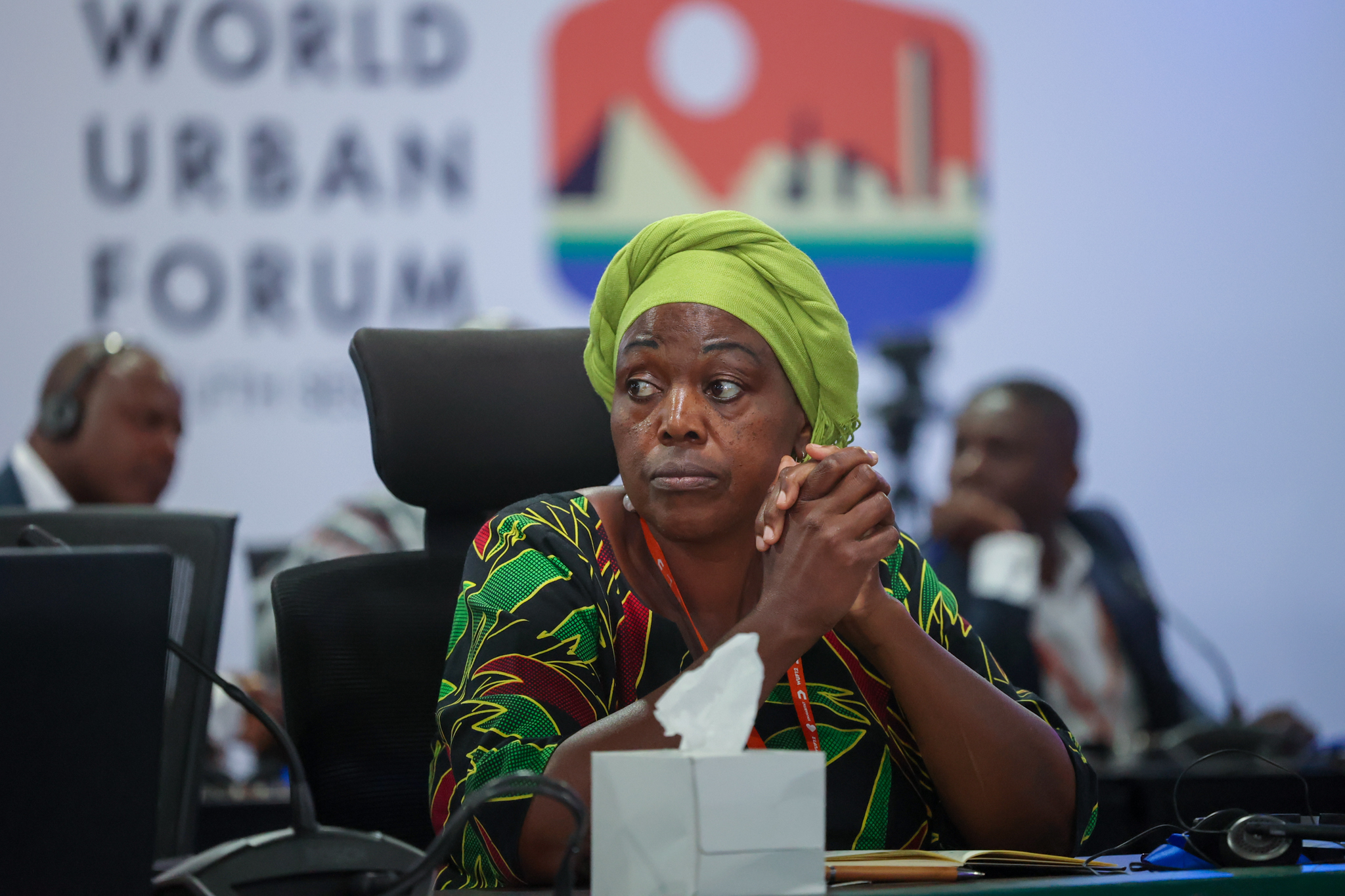WUF12 day 4: Transforming loss into hope and inclusive urban futures
Riding on the fourth industrial revolution
Dialogue 5: Putting People First in a Digital Era addressed the question: How can technology enhance the quality of life in cities and communities while ensuring an open, free, secure, accessible, and human-centred digital future?
Digital advancements are rapidly transforming how people live and work in cities worldwide, making it crucial to harness technology for inclusive prosperity. Khalid Al Baker, CEO of the Quality of Life programme, highlighted Saudi Arabia’s efforts to use technology for human-centred development. The Kingdom launched a platform designed to facilitate communication between decision-makers and the public, using data to shape policies that meet community needs. “In this century, we must use technology and harness it for the benefit of humankind—there is no quality of life without it,” he stated.
Despite these advances, approximately one-third of the global population—around 38 per cent —remains offline and unable to benefit from technological progress. Felicia Williams, UX Director for Google Play, emphasized the importance of promoting digital literacy and equipping people with the skills needed to seize new opportunities. She elaborated that her company has been providing tools, training, and educational resources to refugees, empowering them with essential digital skills.
Panellists also stressed the importance of privacy and security to build trust in digital systems. Building that trust hinges on transparency, fairness, and privacy protections, they noted. As rapid technological advances, such as AI, become increasingly prevalent, clear regulations and ethical governance are essential to safeguard human rights and foster trust in digital ecosystems.

What happens after you lose your home?
Dialogue 6: The Loss of Home explored the profound impact of losing a home, particularly due to conflict and war, and how to rebuild. Panellists agreed that the concept of “home” extends beyond physical structures and is deeply rooted in social and community networks. Mona Fawaz, professor at the American University of Beirut, stated, “We need to involve the neighbourhood in post-war reconstruction and move beyond simply rebuilding homes as individual units. When we lose the sense of collective rebuilding, people are less likely to return, and community issues persist. It is essential to build a sense of togetherness and establish public institutions that foster collective engagement.”
Highlighting the need for community-driven approaches, Ammar Azzouz, British Academy Research Fellow at the University of Oxford, asked, “Reconstruction can offer shiny designs, but the real question is: Is it for the everyday person? Does it provide safety and security for the people?”
Housing reconstruction, panellists emphasized, must prioritize safety, cultural relevance, and long-term suitability. An “owner-driven” approach, where displaced individuals actively participate in designing and building their homes, fosters community ownership, self-reliance, and lasting stability. Raouf Mazou, Assistant High Commissioner for Operations at UNHCR, noted, “Often, forcibly displaced people move toward urban centres because they offer better access to healthcare, social services, and livelihoods.” He explained UNHCR’s shift from viewing displacement as a humanitarian issue to addressing it as a long-term development challenge.
The session included a moving performance by performer and author Mazen Ismai, who recited poetry based on testimonials of families who lost their homes, accompanied by music.
Bridging national policy with local needs
A dedicated roundtable of over 20 parliamentarians discussed strategies to better serve local communities in addressing urban challenges. They emphasized that localization allows parliamentarians to tackle region-specific issues, such as infrastructure needs, environmental vulnerabilities, and cultural factors, by tailoring solutions to local contexts. Localization also empowers parliamentarians to leverage local resources, expertise, and networks to support sustainable development efficiently and build community ownership.
Speakers noted that parliamentarians play a crucial role in fostering partnerships between local governments, private sector actors, and civil society. By providing legislative support for public-private partnerships, they encourage cross-sectoral collaboration to tackle local challenges, enhance urban development outcomes, and leverage diverse expertise and resources.
It all starts at home
The day wrapped up with a special session moderated by UN-Habitat Executive Director Anacláudia Rossbach, centred on WUF12’s theme. The discussion examined five core issues of the New Urban Agenda, placing housing at the heart of both social and ecological functions of land.
The conversation was urgent, with approximately 318 million people worldwide currently homeless and a surge in slum and informal settlement populations. Panellists agreed that ensuring access to land is key; without secure land access, other resources become unattainable. Some speakers highlighted that housing is deeply political, emphasizing the need to reshape power dynamics around housing access through knowledge-sharing and financial inclusivity, empowering marginalized communities to advocate for their rights. Achieving these goals requires collaboration among civil society, local governments, and communities to develop holistic approaches.
WUF as a platform for learning and sharing
On the sidelines, community architect Suhailey Farzana shared her perspective: “Being an architect working in informal low-income settlements, my task is to design with communities and bring people-led processes into the mainstream. WUF is a valuable platform to connect people, our work, values, and hearts.”
Sally Nay from the City of Preah Sihanouk Provincial Hall emphasized the importance of WUF for city development, stating, “The insights gained here are crucial for planning and capacity building for local government officials, especially as we work to ensure that fast urban development remains inclusive and sustainable.
